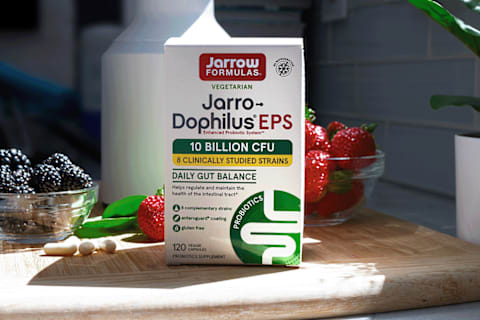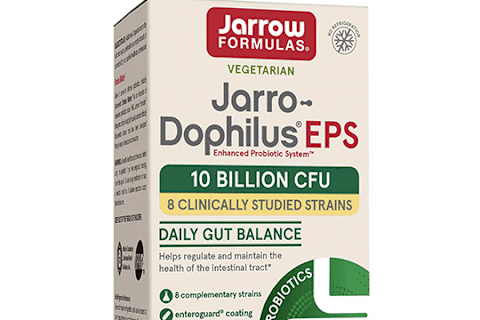Advertisement
Want to Promote Better Gut Health? Try An RD’s Go-To Daily Gut Health Support Habits

Gut health goes beyond relieving occasional or irregular bowel movements. Your gut microbiome has a hand in everything from your immune system to digestion—which is why it’s essential to support your gut health every single day.
But when so many things can impact gut health—think: sleep, diet, and even your oral care routine—it can feel like a never-ending puzzle to know what actually makes your gut microbiome thrive.
While each person’s puzzle ultimately requires a unique solution catered to their lifestyle, diet, and genetics, registered dietitian Toby Amidor, RD, and Jarrow Formulas brand ambassador has a few tips and tricks that can help put you on the right track.
Everyday, the best-selling cookbook author sticks to these gut health non-negotiables to support a healthy body.
Why gut health matters
First things first, it’s important to establish why gut health even matters. Your gut microbiome is a collection of microorganisms—including bacteria, archaea, fungi, and viruses—that live in your intestines. Each person’s gut microbiome is as diverse as their fingerprint (which is why understanding gut health is such a complex topic).
This bacteria plays a range of roles in digestion, including breaking down macronutrients and producing enzymes to break down indigestible carbohydrates. More importantly, it helps absorb nutrients from the foods we eat.
While a healthy gut microbiome is essential for digestion, its impact is far-reaching throughout the body. Your immune health, sleep, and cognitive function are all linked to your gut microbiome.
Immune health
The gut plays an active role in your immune response. Immune cells in the gut interact with your microbiome to train how they respond to fight off pathogens. Research even links a more diverse microbiome with a natural boost in your immunity1.
Sleep
Your gut produces more melatonin2, an essential hormone for regulating sleep, than the pineal gland in the brain. This means a healthy gut is essential to quality sleep. What’s more, there’s a positive correlation between increased microbiome diversity and sleep efficiency.
Cognitive function
The link between your gut health and cognition is known as the gut-brain axis. Gut microbiota produce neurotransmitters, like serotonin and GABA, that play a role in regulating mood and emotions. As a result, any imbalance in gut bacteria can impact your neurotransmitter production and mood3—which means a noticeable dip in your emotions.
Oral health
It’s easy to think of your gut and oral microbiomes as two separate entities, but they’re closely linked4. Your oral microbiome is the second-largest bacteria community within the body, and it can directly impact your gut health. Research shows oral bacteria can move to the gut and alter your microbiome, which can have a direct impact on immune health.
Knowing the importance of your gut health to overall well-being, it’s no surprise you want to support your gut health every single day. Here are a few expert-approved tips to get you started.
Staying hydrated & prioritizing fluid intake
Research estimates up to 47% of Americans do not consume enough water—but staying hydrated isn’t just essential for kidney and immune function. “You need fluids to keep food moving down the gastrointestinal tract,” explains Amidor.
Your water needs will vary based on factors like age, sex, and activity levels. That being said, the National Academy of Medicine recommends science-based daily total water intake amounts as:
- Women: 9 cups
- Men: 12.5 cups
- Pregnant women: 10 cups
- Breastfeeding women: 13 cups
The other 20% of your fluid intake comes from foods, such as fruits and vegetables. And while water should be a top priority, Amidor says it’s important to consider all liquids.
“Any fluid—coffee or soups—counts towards your daily fluid intake,” Amidor adds. Her personal preference? Keeping a can of sparkling water at her desk throughout the day.

Taking a probiotic every single day.*
It’s a tale as old as time—but there’s a reason health experts keep recommending a probiotic for your health routine. Probiotics are good bacteria that help support your health, especially in the digestive tract.*
Despite the importance of probiotics in maintaining the gut microbiome, it’s important to remember not all probiotics are the same.
Most importantly, your probiotics need to actually make it to the gut. That’s why Amidor is a huge fan of Jarrow Formulas’ Jarro-Dophilus® EPS. The shelf-table probiotic has a special EnteroGuard® Coating to protect the probiotics from stomach acid.
“This coating ensures the probiotics actually go into the gut, get absorbed and provide the benefits they’re supposed to,” explains Amidor.
Of course, what’s inside this capsule matters just as much. Unlike other probiotics on the market, Jarro-Dophilus® EPS emphasizes the importance of probiotic strains over the total CFUs to ensure the probiotic provides the benefits your body actually needs.
This proprietary blend combines eight probiotic strains that are clinically studied and selected for their ability to support a healthy gut.* Each 2-capsule serving delivers 10 billion CFU of gut-loving probiotics to help regulate and maintain the health of the intestinal tract.*
Add more polyphenol-containing foods throughout the day
Consuming polyphenol-rich foods5—like cherries, berries, plums, beans, nuts, artichokes, and even coffee—is an underrated way to support your gut health. These antioxidants can increase the helpful or “good” bacteria5 in your gut: Bifidobacterium and Lactobacillus.
“As no recommended daily amount of polyphenols has been established, your best bet is to incorporate polyphenol-packed foods into your daily meals and snacks,” explains Amidor.
Her top recommendations for boosting your polyphenol intake are starting your day with tea or coffee (but staying mindful of any sugar-laden additions like creamer), eating a high-protein yogurt bowl topped with a vibrant berry compote for breakfast, and starting your dinner with a delicious cauliflower-turmeric soup.
Eating plenty of dietary fiber.
When it comes to fiber, Americans are falling short; an estimated 95% of American adults and children do not consume the recommended amount. This common mistake is preventing your gut from operating as its best, as fiber is essential to keeping food moving through your GI.
“I make sure to eat high fiber foods every day,” says Amidor. Beans are her go-to recommendation for sneaking more dietary fiber into her meals (and come with the added perk of additional plant protein).
Plus, research shows adding just one serving of beans to your diet could support cholesterol levels and blood pressure6 at already normal levels.
Get moving every single day.
When Amidor was younger, her mom would encourage running around to get her bowels moving. Now the registered dietitian sees it as a natural way to support her gut health.
“Movement helps your gut motility,” explains Amidor, who prioritizes tennis, HIIT classes, and reformer Pilates. During digestion, the muscles in your GI contract and stretch to keep food moving through your digestive system. Movement can help stimulate these contractions, so you can absorb the nutrients you need and expel the waste that you don’t.
The takeaway
Your gut microbiome might be a complex community of microorganisms, but supporting it is easier than you think. Drinking plenty of water, consuming dietary fiber, moving daily, and taking Jarrow Formulas’ Jarro-Dophilus® EPS is a simple, expert-approved routine for supporting your gut health every single day.*

